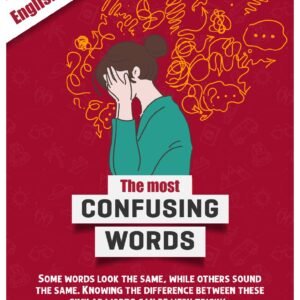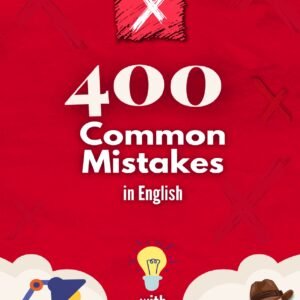Phrasal Verbs – get them right
These are usually two-word phrases consisting of a combination of verb + adverb or verb + preposition. There are hundreds of phrasal verbs in the English language that vary between different English-speaking countries.
Teachers should encourage students to study phrasal verbs as they come across them rather than trying to memorize them. The following is a short list of some example phrasal verbs and their meanings:
Phrasal Verb | Meaning |
add up to something | equal |
back someone up | support |
break down | stop functioning (thing) / get upset (person) |
break up | end a relationship |
call around | phone several places/people |
calm down | relax after a period of excitement |
cut someone off | not talk to someone anymore |
get along with | like each other |
hang up | end phone call |
look forward to something | be excited about the future |
Separable Phrasal Verbs
When some phrasal verbs have a direct object, the two parts of the phrasal verb can be separated.
For example, “break down” is a separable phrasal verb because we can say:
“break down the story” or “break the story down“
Other common separable phrasal verbs include:
get up
turn off
turn down
put off
switch on
Inseparable Phrasal Verbs
Some phrasal verbs can’t be separated from their constituent parts when they take a direct object.
For example, “take care of” is inseparable because we can only say:
“Take care of yourself,” not: “Take yourself care of” or “Take care yourself of”
Other common inseparable phrasal verbs include:
fall back on
get off of
do without
hear of
look up to
run for
stand for
Phrasal verbs are units of speech composed of two or three different words, typically verb + preposition(s), that are commonly referred to as multi-word verbs. A phrasal verb cannot be separated into its constituent words without losing its meaning. Only by taking the phrase as a whole is meaning conveyed. Phrasal verbs are frequently used in the English language and are subject to some regional variations.
Here are some examples of phrasal verbs:
Transitive and Intransitive Phrasal Verbs
Phrasal verbs can be either transitive or intransitive. A transitive phrasal verb always has an object and an intransitive phrasal verb never has an object.
Transitive phrasal verbs
are ALWAYS followed by an object (direct and/or indirect)
can be separable, but not always
For example:
run across – We often run across beautiful birds by the lake. → (inseparable)
→ We often run beautiful birds across by the lake. X WRONG
run across = phrasal verb, birds = object
set up – I set up the tent before it got dark. → (separable)
→ I set the tent up before it got dark. √ CORRECT
set up = phrasal verb, tent = object
Intransitive phrasal verbs
are never followed by an object (direct or indirect)
are always inseparable
For example:
come over – Last night my friends came over. √ CORRECT
came over = phrasal verb, no direct object
Separable & Inseparable Phrasal Verbs
When phrasal verbs have a direct object they are transitive and their constituent words can sometimes be separated by the object.
For example, “turn down” is a separable phrasal verb because we can say:
“turn down the job offer”
or
“turn the job offer down“
On the other hand, inseparable phrasal verbs cannot be separated – the object cannot be placed in the middle of the phrase.
For example, “look up to” is an inseparable phrasal verb because we say:
“The little girl looks up to her father”
but not
“The little girl looks to her father up.”
Here are a few examples of separable phrasal verbs:
Can you switch off the light?
I hung up the phone before Joe could finish his sentence.
She put off our date until next week because she’s busy.
Notice how we can separate the phrases and use them in modified phrases:
Can you switch the light off?
I hung the phone up before Joe could finish his sentence.
She put our date off until next week because she’s busy.
Here are a few examples of inseparable phrasal verbs:
I get confused when I come across unfamiliar vocabulary.
She disagrees with the decision of the president.
Do you think you can fill in for me while I’m on vacation?
Notice what happens when we try to separate them:
I get confused when I come unfamiliar vocabulary across.
She disagrees the decision with the president.
Do you think you can fill me in for while I’m on vacation?
The sentences are no longer correct, and the meaning is confused.










COULD YOU PLEASE POST A TOPIC ON VERBS, IDIOMS, AND POLITE SENTENCES USES WHILE WORKING IN A SERVICE INDUSTRY AND ALSO THE IMPORTANT ONE IS HOW TO SAY NO OR REJECT OPINION OF SOMEONE IN A POLITE AND RELATABLE WAY.
Can I get a PDF for this magazine?